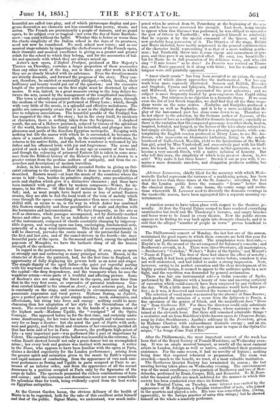After the Philharmonic, the most important concert of the week
has been that of the Royal Society of Female Musicians, on Wednesday even- ing. It was an ample musical banquet, as nearly all the most eminent artists in London, foreign as well as native, contributed their gratuitous assistance. For the same reason, it had no novelty of feature; nothing being done that required rehearsal or preparation. The room was crowded,—much to the benefit, we trust, of a most valuable institution. The Beethoven Quartet Society has terminated its season ; the last meeting having taken place on Wednesday evening. Tho entertainment was of the usual excellence,—two quartets of Beethoven and two of Men- delssohn, performed by Ernst, Cooper, Hill, and Rousselot. To M. Reim- selot the musical public are much indebted for the manner in which this society has been conducted ever since its formation. At the Musical Union, on Tuesday, some interest was excited by the appearance of M. Seligmann, a Parisian violoncellist of note, who joined in the quartets and played a solo. His tone was somewhat thin, (owing, apparently, to the foreign practice of using thin strings,) but he showed himself on the whole a masterly performer.


























 Previous page
Previous page